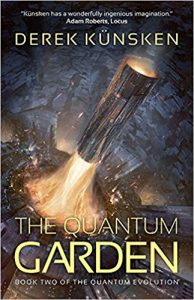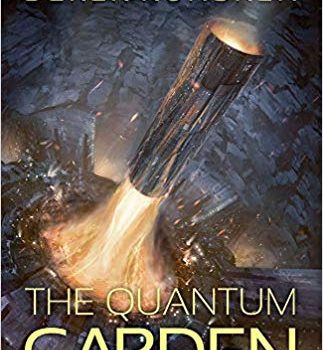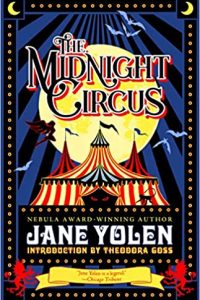Adam Roberts Reviews The Quantum Garden by Derek Künsken
 The Quantum Garden, Derek Künsken (Solaris 978-1781085714, $11.99, 300pp, tp) October 2019.
The Quantum Garden, Derek Künsken (Solaris 978-1781085714, $11.99, 300pp, tp) October 2019.
I reviewed Künsken’s debut novel The Quantum Magician for Locus and was, I can be honest, unsurprised Solaris elected not to use my summary judgment as a cover-blurb, viz.: “It’s not Proust but it passes the time.” Now here’s the follow-up volume: The Quantum Garden, Quantum Evolution #2. It is more of the same. If you liked the first volume you’ll probably like this, and if you didn’t you probably won’t, and if there’s a greater abdication of a reviewer’s responsibility than saying so, I’m not sure what it is.
The same in this particular “more of the same” is the space-operatic crew of misfits against the powers-that-be vibe of the original novel. Our hero is Belisarius Arjona, a genetically modified homo quantus able to “see” the quantum states that we ordinary hom. saps. automatically collapse into Newtonian certainties. Bel is an interstellar con-man, hired in the first volume to orchestrate a complicated heist with a view to smuggling certain advanced starships through certain closely guarded wormholes (these wormholes, left by a long-departed alien civilisation, effectively constitute the galaxy’s freeway network). Bel assembles his crew: a sort of human-manatee hybrid, an AI who believes itself to be the apostle Saint Matthew, and various others, including a fellow homo quantus called Cassandra, who is there in part as a will-they-won’t-they love interest for Bel. It’s hardly a spoiler to say that volume one sees this crew pull-off their “audacious” heist, because, seriously: what else would you expect?
The Quantum Garden follows straight on from the end of The Quantum Magician, and is more by way of being a chase thriller than the first volume’s Ocean Eleven-y caper. Bel and his crew are now on the run after successfully heist-ing, or actualising heistality, or whatever the proper idiom is, having gotten away with loot that includes certain “time gates.” But the authorities chasing them, a frenchified outfit called the Congregate, are as implacable as they are ruthless. All the universe’s homines quanti (the correct plural, this, though it’s a usage of which Künsken seems innocent) live inside a hollowed-out asteroid called “the Garret.” At the beginning of The Quantum Garden, the pursuant authorities blitz this worldlet, enacting genocide on its inhabitants. The novel starts with this crime, although Bel and his team immediately use their time gates to go back and evacuate the Garret before it is destroyed. Thereafter they go back on the run, pursued by the Congregate through various cats-cradle, grandfather-paradox-style complications. “Will our guys get away?” is one narrative hook. The other is: “Will they be able to avoid violating causality?” As one of Bel’s crew notes, utilizing what K. presumably thinks is salty liveliness, though as a whole the novel struck me as rather drearily underpowered, swear-wise: “I don’t know shit about time travel, but it seems to me that if some cocksucker sneezes wrong, history puts our huevos in the cutter.”
Well, quite.
There’s a Terminator-rip-off vengeance robot called “The Scarecrow,” some vegetable intelligences, lots of rather dry political intrigue inside the Congregate, and a good deal of space-age running around and fighting. And it passes the time. That’s not to say it’s by any means flawless. The Quantum Garden‘s story, though it construes its time-travel complications neatly enough by the end, is too small for its rather saggy, over-long plot, which accordingly hangs on it like a giant’s coat on a dwarf. Characters run along the rails their creator has set them. The prose is not what anyone would call highly finished. This last is not just the many split-infinitives, or the sentences that end with prepositions, or Künsken’s tendency toward cliché – characters have “wicked-looking” scars or “wolf down” their dinners, fists “slam” into faces (“the fist darted forward like a striking snake”) and so on – but of a kind of greyness of style. Dialogue is stilted, characters unload information upon one another rather than talking, getting one another up-to-date with the latest plot situation: “politically, a client nation is in open rebellion. Militarily, the dreadnought Parizeau was destroyed and we’re certain the Homo quantus had a role,” says one. “You have powerful pass-codes. Saint Matthew is faster than any processor this era is carrying, he could look into Rudo’s communications,” says another. Künsken captures none of the rhythm or snap of actual hesitant, phatic, emotional, and social human conversation. “The Homo quantus examine the nature of reality,” Bel mansplains, late in the novel. “Causality isn’t just linear. It can branch in lines, forward and backwards in time. It can take other geometric forms: two-dimensional sheets, solids….” “I’m not looking for a lecture in graphs, Arjona!” snaps his interlocutor, speaking, I feel, for all of us.
Of course, in one sense, it misses the point to object to this kind of thing. Künsken is a tell-don’t-show kind of writer and SF has always had room for such individuals. For many readers prose, character, and even plot exist as nothing more than delivery systems for cool pseudo-scientific speculation, futuristic tech, and imaginary alien species. The Quantum Garden certainly provides plenty of these latter, and if that’s what you’re looking for then this garden, though not exactly Edenic, will at least provide you with an agreeable space in which to stroll.
This review and more like it in the December 2019 issue of Locus.
 While you are here, please take a moment to support Locus with a one-time or recurring donation. We rely on reader donations to keep the magazine and site going, and would like to keep the site paywall free, but WE NEED YOUR FINANCIAL SUPPORT to continue quality coverage of the science fiction and fantasy field.
While you are here, please take a moment to support Locus with a one-time or recurring donation. We rely on reader donations to keep the magazine and site going, and would like to keep the site paywall free, but WE NEED YOUR FINANCIAL SUPPORT to continue quality coverage of the science fiction and fantasy field.








